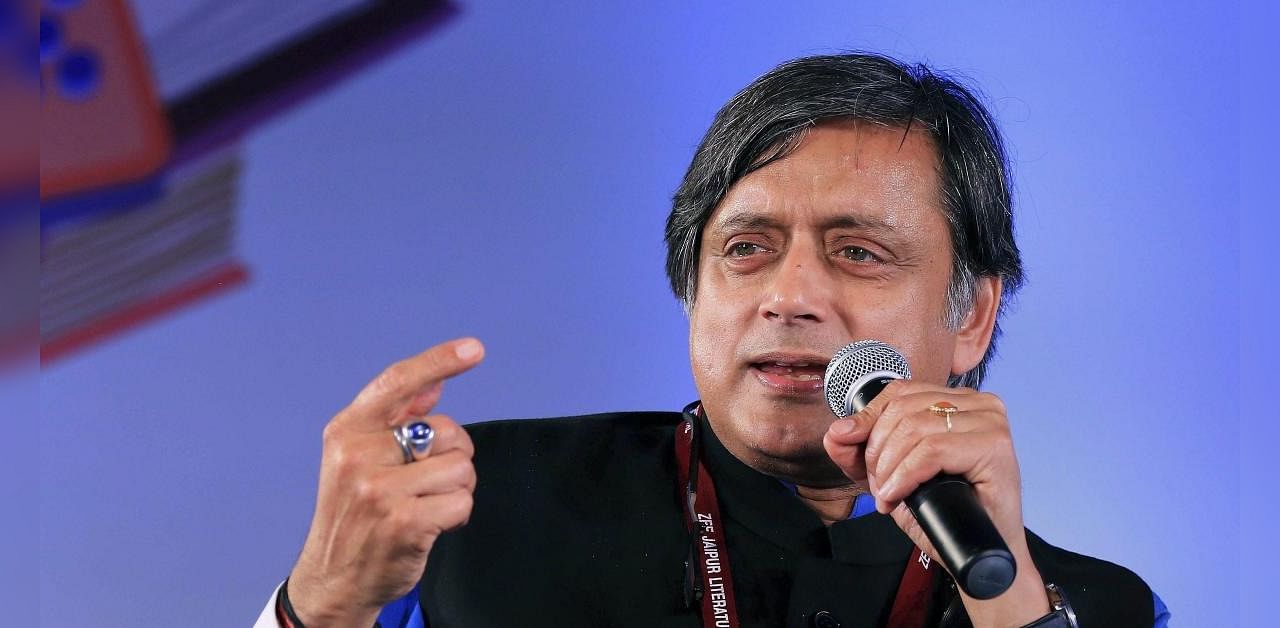
Words are a world of their own with an exciting history waiting to be unveiled. Familiar or unfamiliar, they sure have a story to narrate. In his new book Tharoorosaurus, published by Penguin Random House, Lok Sabha MP and bestselling author Dr Shashi Tharoor shares 53 examples from his vocabulary -- unusual words from every letter of the alphabet.
In an interview with DH's Anupama Ramakrishnan, Tharoor talks about how he cherry-picked the words, why 'Satyagraha', 'pandemic' and 'quarantine' find a pride of place in the book and how his father's word-game addiction influenced him.
Q. Dr Tharoor, Tharoorosaurus is dedicated to your father Chandran Tharoor. How did he inculcate in you the love for writing, especially your interest in words?
A. My father was an immense influence on my life. He was a teacher, guide, research adviser, imparter of values, my source of faith, energy and self-belief. My enthusiastic approaches to life and learning are inherited from him; so is my work ethic — and my love for words. He was a word-game addict, from Scrabble to Boggle and acrostics in newspapers, and would make up games with my sisters and me, seeing how many words with four letters or more we could make up from the letters in a nine-or-ten letter word. Another one we played on long car journeys was when one passenger had to imagine a five-letter word, and the others guessed at it for 20 attempts by trying out five-letter words and being told how many letters matched. This great love of words and language, and the inventive ways my father put it to practice, inevitably rubbed off on his eldest child: me! But it was never just words for their own sake. My father instilled in me the conviction that words are what shape ideas and reflect thought, and the more words you know, the more precisely and effectively are you able to express your thoughts and ideas.
Q. Could you tell us how you cherry picked the words and blended it with the contemporary world in this book of yours?
A. The contemporary world did play a large part in the selection I curated. Words like “pandemic”, “impeachment”, and “quarantine” have lately been ubiquitous in the media that surrounds us. Some I’d recently used in tweets – “farrago”, notoriously, and “snollygoster”. It made sense to include these to reflect the goings-on of the world. For some others, I just felt I could tell some interesting stories about them: “defenestrate” and “curfew” come to mind. It was difficult to whittle the book down to just 53!
Q. The word 'Satyagraha' makes quite an interesting and surprising entry into this book. Why did you choose it?
A. The book is aimed at an Indian audience, and I wanted to remind readers that the English language borrows liberally from other languages, including Indian ones. I had notoriously written in my The Great Indian Novel three decades ago that the British had taken the Hindi word “loot” into their dictionaries as well as their habits. The process continues, from “jungle” to “shampoo” to “cash” to “dungaree” and into the present!
“Satyagraha” was coined in South Africa after a newspaper contest initiated by Mahatma Gandhi who wanted an alternative to the term “passive resistance” that British journalists were using for his methods – he felt if you were going to fight for Truth, you had to be active about it, not passive. That was a story worth telling.
Q. Why 53 selected words? Any favourites that you would have liked to put forth but could not?
A. I decided to include one for every week of the year. To cover all bases, I also threw in a bonus word to account for the extra week in a leap year – hence, 53 words! Honestly, I find it hard to pick favourites, but the language has several thousands more to offer.
Q. Do you sometimes use these complicated words in casual conversations? How often are people taken aback by the usage of such words?
A. I am aware, I have a reputation of being some sort of walking-talking Thesaurus. I hasten to say this is not true! The purpose of words is to communicate, and you can’t communicate if you’re not understood. As I once said in a firmly tongue-in-cheek tweet, I choose my words because they best express the idea I want to convey, not because they are the most obscure or rodomontade ones!
Q. You’ve mentioned the dos and don’ts in the section 'Apostrophe'. Are you a do’s person or a dos person?
A. Do’s, definitely. As I point out, when you say “dot the i’s and cross the t’s”, if you didn’t use the apostrophe, it would be “dot the is and cross the ts!”
Q. Any of the words in English language that you would like to ‘defenestrate’ or ‘boycott’? And why?
A. No, I’m happy to embrace all words equally – they are all usable, after all!
Q. Did you ever want to be an English teacher? Would you consider it in future?
A. I don’t think I have ever seen myself as an English teacher. I am neither a linguist nor a philologist. My love of words does not stem for words in and of themselves, but rather the ideas that they can be used to convey. There are plenty of brilliant scholars and teachers working in the field of English, but I think of myself more as a doer than a teacher. I read and write the language, and if anyone learns from my doing that, more power to them!
Q. Would you also consider doing a Tharoorosaurus in Malayalam sometime in the future?
A. Actually a Malayalam translation – which would in part be bilingual – is indeed coming out from Mathrubhumi Books. But a Malayalam original – no way. My vocabulary in Malayalam consists principally of words to use in political speeches – that would make for a very limited book!
